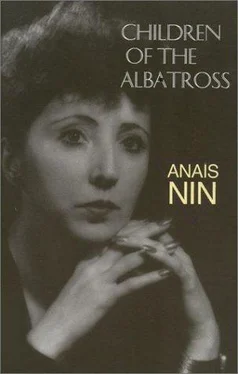Anaïs Nin - Children of the Albatross
Здесь есть возможность читать онлайн «Anaïs Nin - Children of the Albatross» весь текст электронной книги совершенно бесплатно (целиком полную версию без сокращений). В некоторых случаях можно слушать аудио, скачать через торрент в формате fb2 и присутствует краткое содержание. Год выпуска: 1959, ISBN: 1959, Издательство: Swallow Press, Жанр: Классическая проза, Эротические любовные романы, на английском языке. Описание произведения, (предисловие) а так же отзывы посетителей доступны на портале библиотеки ЛибКат.
- Название:Children of the Albatross
- Автор:
- Издательство:Swallow Press
- Жанр:
- Год:1959
- ISBN:9780804000390
- Рейтинг книги:4 / 5. Голосов: 1
-
Избранное:Добавить в избранное
- Отзывы:
-
Ваша оценка:
- 80
- 1
- 2
- 3
- 4
- 5
Children of the Albatross: краткое содержание, описание и аннотация
Предлагаем к чтению аннотацию, описание, краткое содержание или предисловие (зависит от того, что написал сам автор книги «Children of the Albatross»). Если вы не нашли необходимую информацию о книге — напишите в комментариях, мы постараемся отыскать её.
Children of the Albatross — читать онлайн бесплатно полную книгу (весь текст) целиком
Ниже представлен текст книги, разбитый по страницам. Система сохранения места последней прочитанной страницы, позволяет с удобством читать онлайн бесплатно книгу «Children of the Albatross», без необходимости каждый раз заново искать на чём Вы остановились. Поставьте закладку, и сможете в любой момент перейти на страницу, на которой закончили чтение.
Интервал:
Закладка:
He went to his studio and Lillian locked the door of the bedroom and sat at her piano, to seek in music that wholeness which she could not find in love…
Just as the sea often carries bodies, wrecks, shells, lost objects carved by the sea itself in its own private studio of sculpture to unexpected places, led by irrational currents, just so did the current of music eject fragments of the self believed drowned and deposited them on the shore altered, recarved, rendered anonymous in shape. Each backwash, each cross-current, throwing up new material formed out of the old, from the ocean of memories.
Driftwood figures that had been patiently recarved by the sea with rhythms broken by anger, patiently remolding forms to the contours of knotted nightmares, woods stunted and distorted by torments of doubts.
She played until this flood of debris rose from the music to choke her, closed the piano with anger, and rose to plan her escape.
Escape. Escape.
Her first instinctive, blind gesture of escape was to don the black cape copied from Sabina’s at the time of their relationship.
She wrapped Sabina’s cape around her, and put two heavy bracelets around her wrist (one for each wrist, not wanting any more to be in bondage to one, never to one; she would split the desire in two, to rescue one half of herself from destruction).
And for the first time since her marriage to Jay, she climbed the worn stairs of a very old hotel in Montparnasse, experiencing the exaltation familiar to runaways.
The more she could see of the worn carpet and its bare skeleton, the more acrid the smell of poverty, the more bare the room, this which might have lowered the diapason of another’s mood only increased the elation of hers, becoming transfigured by her conviction that she was making a voyage which would forever take her away from the prison of anxiety, the pain of dependence on a human being she could not trust. Her mood of liberation spangled and dappled shabbiness with fight like an impressionist painting.
Her sense of familiarity with this scene did not touch her at first: a lover was waiting for her in one of the rooms of this hotel.
Could anyone help her to forget Jay for a moment? Could Edgar help her, Edgar with his astonished eyes saying to her: You are wonderful, you are wonderful! Drunkenly repeating you are wonderful! as they danced under Jay’s very eyes not seeing, not seeing her dancing with Edgar in the luminous spotlight of a night club, but when her dress opened a little at the throat she could smell the mixed odor of herself and Jay.
She was taking revenge now for his effusive confessions as to the pleasures he had taken with other women.
She had been made woman by Jay, he alone held in his hands all the roots of her being, and when he had pulled them, in his own limitless motions outward and far, he had inflicted such torture that he had destroyed the roots all at once and sent her into space, sent her listening to Edgar’s words gratefully, grateful for wo hands on her pulling her away from Jay, grateful for his foolish gift of flowers in silver paper (because Jay gave her no gifts at all), and she would imagine Jay watching this scene, watching her go up the stairs to Edgar’s room, wearing flowers in a silver paper, and she enjoyed imagining his pain, as he witnessed the shedding of her clothes, witnessed her lying down beside Edgar. (You are the man of the crowd, Jay, and so I lie here beside a stranger. What makes me lonely, Jay, are the cheap and gaudy people you are friendly with, and I lie here with a stranger who is only caressing you inside of me. He is complaining like a woman: you are not thinking of me, you are not filled with me.)
But no sooner had she shed her cape copied from Sabina’s than she recognized the room, the man, the scene, and the feelings as not belonging to her, not having been selected by her, but as having been borrowed from Sabina’s repertoire of stories of adventures.
Lillian was not free of Jay since she had invited him to witness the scene enacted solely to punish his unfaithfulness. She was not free, she was being Sabina, with the kind of man Sabina would have chosen. All the words and gestures prescribed by Sabina in her feverish descriptions, for thus was much experience transmitted by contagion, and Lillian, not yet free, had been more than others predisposed to the contagion by lowered resistance!
She was ashamed, not of the sensual meeting, but for having acted in disguise, and eluded responsibility.
When the stranger asked her for her name she did not say Lillian, but Sabina.
She returned home to shed her cape and her acts, pretending not to know this woman who had spent hours with a stranger.
To put the responsibility on Sabina.
Escape escape escape—into what? Into borrowing the self of Sabina for an hour. She had donned the recklessness of Sabina, borrowed her cape for a shy masquerade, pretending freedom.
The clothes had not fitted very well.
But after a while, would this cease to be a role and did the borrowing reveal Lillian’s true desires?
The possibility of being this that she borrowed.
Blindly ashamed of what she termed unfaithfulness (when actually she was still so tied to Jay it was merely within the precincts of their relationship that she could act, with his presence, and therefore unsevered from him), she discarded all the elements of this charade, cape, bracelets, then bathed and dressed in her own Lillian costume and went to the cafe where she sat beside Sabina who had already accumulated several plates by which the waiter was able to add the number of drinks.
When Jay felt exhausted after hours of painting he went to see Djuna.
He always softened as he thought of Djuna. She was to him more than a woman. It had been difficult at first to see her simply as a woman. His first impression had been an association with Florentine painting, his feeling that no matter what hr origin, her experiences, her resemblances to other women, she was for him like a canvas which had been covered first of all with a coating of gold paint, so that whatever one painted over it, this gold on which he had dissertated during one of his early visits to her, was present as it remained present in the Florentine paintings.
But even though his obsession for dispelling illusions, which made him pull at her eyelashes to see if they were real, which made him open jars and bottles in the bathroom to see what they contained, even though he always had the feeling that women resorted to tricks and contrived spells which man must watch out for, he still felt that she was more than a woman, and that given the right moment, she was willing to shed the veils, the elusiveness, and to be completely honest.
It was not her clarity either, which he called honesty. Her clarity he distrusted. She always made wonderful patterns—he admitted that. There was a kind of Grecian symmetry to her movements, her life, and her words. They looked convincingly harmonious, clear—too clear. And in the meanwhile where was she? Not on the clear orderly surface of her ideas any longer, but submerged, sunk in some obscure realm like a submarine. She had only appeared to give you all her thoughts. She had only seemed to empty herself in this clarity. She gave you a neat pattern and then slipped out of it herself and laughed at you. Or else she gave you a neat pattern and then slipped out of it herself and then the utterly tragic expression of her face testified to some other realm she had entered and not allowed one to follow her into, a realm of despair even, a realm of anguish, which was only betrayed by her eyes.
What was the mystery of woman? Only this obstinacy in concealing themselves—merely this persistence in creating mysteries, as if the exposure of her thoughts and feelings were gifts reserved for love and intimacy.
Читать дальшеИнтервал:
Закладка:
Похожие книги на «Children of the Albatross»
Представляем Вашему вниманию похожие книги на «Children of the Albatross» списком для выбора. Мы отобрали схожую по названию и смыслу литературу в надежде предоставить читателям больше вариантов отыскать новые, интересные, ещё непрочитанные произведения.
Обсуждение, отзывы о книге «Children of the Albatross» и просто собственные мнения читателей. Оставьте ваши комментарии, напишите, что Вы думаете о произведении, его смысле или главных героях. Укажите что конкретно понравилось, а что нет, и почему Вы так считаете.












